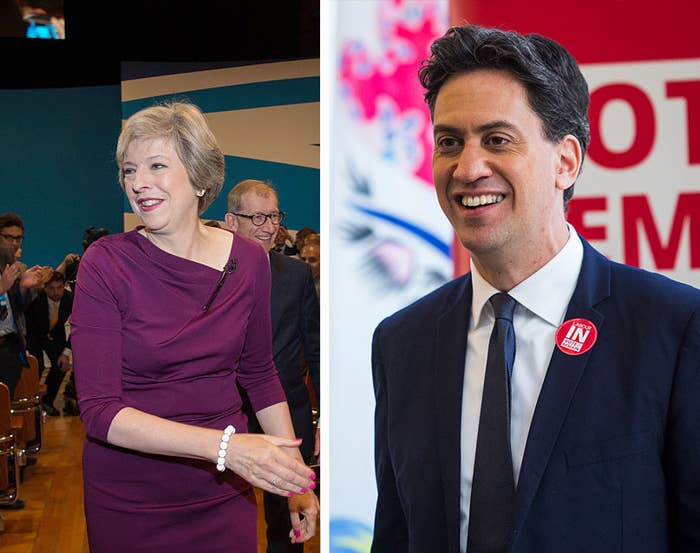
Theresa May’s social policies on grammar schools and immigration, unveiled at the Conservative party’s annual conference in Birmingham, represent a shift to the right in Tory policy.
But her economic pledges to push government intervention in the economy, give workers representation on boards, and cap energy prices reminded some Labour veterans of former leader Ed Miliband.
“So Milibandism made it to Downing Street,” one former senior adviser to the ex–Labour leader told BuzzFeed News after reading the speech. “Just not the man himself.”
Tom Baldwin, Miliband’s former press chief, echoed the sentiment on Twitter: “Given the number of our lines Theresa May has now borrowed, used and abused, quite a lot of [the speech] WAS written by Ed Miliband.”
The assessment is with good reason: While Theresa May pushed to the right on immigration, her speech contained economic policies Ed Miliband had adopted in his failed 2015 general election campaign – and which were viciously attacked by the Conservatives.
Miliband himself acknowledged the bizarre situation, tweeting “Marxist, anti-business interventionism imho” when he saw that May was proposing caps on energy prices. When he proposed the same policy he was viciously criticised by Tory MPs and Conservative-supporting media outlets for suggesting the energy market wasn’t working.
Now, just a year and a half after the general election, he was listening to a new Conservative prime minister declare that “where markets are dysfunctional, we should be prepared to intervene” and state that she would be “coming after” tax avoiders.
The prime minister even used her final speech to issue a staunch defence of government intervention in the economy, a move that would have been anathema to her predecessor.
“It’s time to remember the good that government can do,” said Theresa May. “Time for a new approach that says while government does not have all the answers, government can and should be a force for good; that the state exists to provide what individual people, communities and markets cannot; and that we should employ the power of government for the good of the people.”
Right-wing free market think tanks and business groups that usually issued gushing press releases about the latest Conservative policies during the Cameron era were reduced to attacking the prime minister.
“This was an alarming attack on free markets and the prime minister's pledge for more state intervention in business completely disregards the evidence that competition, deregulation and a light-touch approach breeds the best results,” said Mark Littlewood of the purist free market campaign group the Institute of Economic Affairs.
A similarly outraged response came from the free market Adam Smith Institute, which once influenced the policies of Margaret Thatcher: “We call on the prime minister to abandon her ideological attachment to interventionist economic policies, look at the evidence, and that it tells us that markets, not the state, are the solution to our problems."
The former Miliband adviser told BuzzFeed News a left-wing approach to economics and a right-wing approach to immigration and law and order certainly fitted the view of the majority of British voters. But that didn’t necessarily mean it was a cohesive whole.
“Whether it makes any sense beyond that is another matter,” they reflected.
